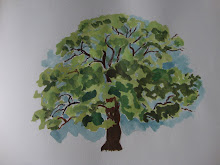And all the men and women merely players:
They have their exits and their entrances;
And one man in his time plays many parts
I shall dwell on that later.
I went to the concert where sarod maestro Amjad Ali Khan played along with the Scottish Chamber Orchestra . It was a nice evening.
My ears are not attuned to Western Classical music. And personally, I cannot listen to Western classical music over the radio, the music is soft at parts and then suddenly very loud ... yet I have realised that I like watching the musicians play live and that is when I truly appreciate the effort that goes into the performance. The coordination of many instruments on stage has me enthralled.
Since it was a music fusion of sorts there was also a striking difference in the two styles. The Indian duo of sarod and tabla players came to the stage with just their music instruments and tuning tools. The sarod maestro faced the stage and respectfully covered his foot that faced the audience with a shawl. The westerners sat in a semi circle while the conductor had his back to the audience. Their music sheets all kept ready. Western Classical music, I learn, has a very disciplined structure while Indian classical music involves more improvisations done spontaneously during the performance.

The conductor has always fascinated me. What did he actually do? The Western musicians at any rate had their sheets which they dutifully turned as they played along. At previous performances, I had observed that the musicians frequently looked up from their notes at the conductor. In this performance however, they did not seem to do that at all. They required no cue from the conductor and played to perfection.
Soon after the concert I logged online to have a better understanding of the role the conductor had in the orchestra. And from what I read, it seems that he was not just there to wave his hands about. Conductors communicated the directions to performers. They set the tempo and get the act together. They choose the compositons. They need to have a deep understanding of the basic elements of musical expression, and the music instruments that make up the orchestra. The wave and smaller movements, the flow of the hands all have something to convey to the musician. The conductor has to learn the entire score while the individual musicians need to master just their pieces. He would have to know precisely when each instrument would join in or fade out. Besides he was the public face of the group .
A very important role indeed.
In the larger picture ... in a philosophical vein .... Is the world a concert ( apologies to Shakespeare) and are we the players . And the conductor ?
I have edited this part here. The younger one who read the post in my presence felt that it was just not me - and I kind of agreed with her. Abrupt as it may be..


No comments:
Post a Comment
Would love to know what you have to say: